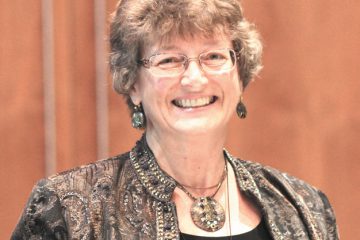Master and commander
Children of the Bible Series
Jewish Family Identity Forum

By Candace R. Kwiatek, The Dayton Jewish Observer
“Hold it right there!” Adam says to Eve. “Say cheese…OK, got it.”
“Well, Adam,” Eve says, looking at the snapshot, “the fields in the background look great, but it’s not the best shot of the kids – Abel came out fine, but Cain still looks moody and resentful.”
“It’ll have to do for now, Eve. Stick it in the album until we get a better one.”
Only there never was a better one.
Like our family photo album, the Torah captures images of children in ways that both spotlight the youngsters’ adventures and teach us about our innermost selves and our relationships with one another.
On a simple level, the story of the Bible’s first “children,” Adam and Eve, was about disobeying God’s command not to eat the fruit of the tree of knowledge and the resultant consequences. But at a deeper level it was about creating ourselves through our actions.
Similarly, Cain and Abel is a simple tale at first glance. These first biblical brothers bring offerings to God: Cain, fruits from the soil; Abel, the choicest firstlings of his flock. God accepts only Abel’s offering; Cain is distressed to such an extreme that he rises up in the field and kills Abel.
When God asks Cain about Abel’s whereabouts, Cain retorts, “Am I my brother’s keeper?”
Is there some deeper lesson that we can glean from this tale, beyond the obvious admonitions to avoid jealousy and to care for others?
Numerous commentators weigh in on why God accepted the sacrifice of Abel but not that of Cain.
W. Gunther Plaut, editor of The Torah: A Modern Commentary, notes that the key to God’s preference is found in the worshipers’ intent: Cain merely brings “an offering” while Abel brings “the choicest.” Along the same lines, the text’s wording suggests that Abel brought himself — heart and soul — along with his offering (S’fat Emet on Genesis 4:4).
A modern midrash imagines that Cain really did try to give his heart-and-soul best — he actually fashioned handmade bread from his produce — but it burned up in the oven (Biers-Ariel, The Triumph of Eve).
In a personal reflection, a recent student suggested that he believed Cain truly desired to do right, but he just didn’t understand what was expected.
Ultimately, it may be that God’s reasons are simply unknowable: “I will be gracious to whom I will be gracious,” God comments (Ex. 33:19).
In the end, however, does it matter? When we look for God’s reasons, aren’t we really trying to justify Cain’s reactions by making God at least partially responsible? In fact, don’t we regularly try to excuse bad behavior as the natural consequence of some other force or circumstance: bad upbringing, poor education, lack of knowledge, economic challenges, limited opportunities, bad luck and on and on?
Perhaps the lack of a clear-cut reason for God’s preference is the message: Why do bad things happen? It’s unknowable.
What is important is how you choose to respond, a core biblical principle aptly captured by Henry Ward Beecher: “God asks no man whether he will accept life. That is not the choice. You must take it. The only choice is how.”
The story of Adam and Eve teaches part of the “how.”
“At any given moment, we’re free to choose what to think and what to do. God gave us a free will…once we realize that we do things by choice, we begin to accept greater responsibility for our own lives and to take more effective control over them. We’re the results of our choices,” writes Hal Urban in Life’s Greatest Lessons: 20 Things that Matter.
But along with the intellectual ability and freedom to make conscious choices about our behavior, humans are also endowed with a yetzer tov and a yetzer ra (loosely translated as good and evil inclinations, respectively) that add an emotional component to this decision-making.
In a brief and often overlooked exchange (Gen. 4:7), God cautions the resentful Cain to master his emotions: “Surely, if you do right, there is uplift. But if you do not do right, sin couches at the door; its urge is toward you, yet you can be its master.”
From its very beginnings, Judaism views mastery over one’s emotions as an act of heroism and a sign of good character. Such mastery is a deliberate choice, an expression of the gift of free will, resulting in the ability to fashion one’s own identity.
On the other hand, when we lose control and allow our emotions to govern us, we are no longer consciously and deliberately creating ourselves.
Furthermore, when we temporarily abdicate self-control and allow our emotions to run rampant, we have a greater potential for hurting others around us.
We can’t be trusted to safeguard our neighbor’s property, a friend’s well-being, or the stranger’s safety if we allow our emotions to rule.
Thus, on one level, Cain’s question was infused with irony: “Am I my brother’s keeper?” How could he be? He wasn’t even his own “keeper” — he let his emotions rule.
On another level, perhaps Cain’s question was an “aha” moment: “Oh, am I (supposed) to be my brother’s keeper? (Is that why I’m supposed to control my emotions?)”
Whether we like it or not or even believe it or not, we alone determine who we will become. Because free will is part of our very nature, we decide how to react to adversity and we choose whether or not to master our emotions.
We can choose to take charge and full responsibility. Or we can allow ourselves to be molded by circumstances and emotions. But this, too, is a choice, not an inevitability.
Our choices affect who and what we are — to ourselves and to others. It’s up to us to be our own master and commander.
Family Discussion: Syndicated talk show host and speaker Dennis Prager regularly addresses the topic of “Happiness is a moral obligation.” By this he means that, while we can’t control circumstances or feelings, we are obligated to act pleasant around others. How does Prager’s thesis fit with the lessons of “controlling our actions” and being our brother’s keeper?
Literature to share
The Other Side of the Island by Allegra Goodman deserves the accolade of best book of the year. With echoes of The Giver (Lois Lowry), Brave New World (Aldous Huxley), and Harrison Bergeron (Kurt Vonnegut), this dystopian fiction is appropriate for young adults. Would you just go along with the pronouncements of Earth Mother and the overarching Corporation? Or would you be one of those who doesn’t follow the rules?
The Fifth Servant by Kenneth Wishnia is easily devoured but not easily classified: adventure novel? historical fiction? murder mystery? Set in 16th-century Prague, it brings to life a long-vanished culture and the not-yet-extinguished blood libel, the irrational accusation of ritual murder of Christians by Jews.



